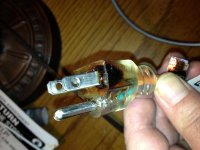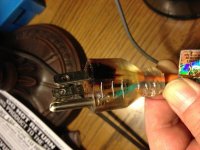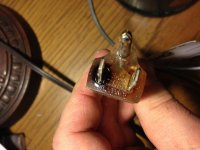Pics below are of the plug for the cord I used t power my 1000 watt HPS and exhaust fan. Its a 25 foot 14 gauge rigid cord from lowes.
Typically I inspect my cords and surge protectors for signs of overheating once a month or so. It have been about 45 days since I last looked at this. I have no idea if this happened prior to HUrrican Sandy bringing down my power lines(resulting in a disconnected neutral wire), or if this was the result of that event, or if it was just a faulty cord from the manufacturer.
Thoughts?
Typically I inspect my cords and surge protectors for signs of overheating once a month or so. It have been about 45 days since I last looked at this. I have no idea if this happened prior to HUrrican Sandy bringing down my power lines(resulting in a disconnected neutral wire), or if this was the result of that event, or if it was just a faulty cord from the manufacturer.
Thoughts?





